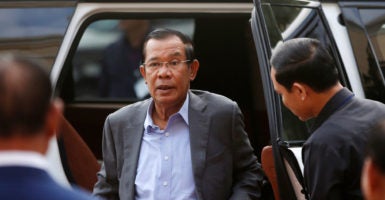The ruling Cambodian People’s Party swept all 58 seats up for grabs in recent Senate elections.
The electoral sweep was unsurprising, given that democracy in the country has been on a downward spiral since the July 2013 elections, and in even more precipitous decline since the arrest of the main opposition leader, Kem Sokha, last September.
The U.S. and the international community must closely watch Cambodia’s descent from democracy and put in place measures to hold Cambodia’s leader, Hun Sen, and the Cambodian People’s Party accountable.
Several events have occurred over the past six months that cleared the way for yet another ruling-party victory.
On Oct. 6, the Cambodian Interior Ministry filed a lawsuit to dissolve the opposition party, claiming that the Cambodia National Rescue Party colluded with the U.S. government to overthrow the current Cambodian leadership.
The Cambodia National Rescue Party was officially dissolved by the Cambodian Supreme Court on Nov. 16.
In addition to dissolving the opposition, Hun Sen began a significant crackdown on civil society, shutting down the main English-language newspaper, The Cambodia Daily, and threatening and subsequently expelling election-monitoring agencies, such as the National Democratic Institute.
This is taken right out of Hun Sen’s pre-election playbook, in which he typically cracks down on potential opposing voices ahead of elections.
The U.S. government’s response to democratic backsliding in Cambodia is getting stronger.
Immediately following the dissolution of the Cambodia National Rescue Party in November, the U.S. government pulled its support for Cambodia’s expected July 29 presidential election. Then in December, the State Department issued a visa ban restricting travel for Cambodian officials.
And just last week, in response to the undemocratic Feb. 25 elections, the White House announced its decision to “suspend or curtail several Treasury, USAID, and American military assistance programs intended to support the General Department of Taxation, the capacity of local government authorities, and the Cambodian military, each of which has been linked to these setbacks.”
Both the executive branch and Congress have stopped short of sanctioning Cambodian officials for their involvement in the backsliding of democracy in Cambodia. Even just threatening sanctions may lead to a shift in Hun Sen’s decision-making calculus.
U.S. leadership on Cambodia is welcome, but more can be done.
First, the U.S. should threaten and follow through with targeted sanctions against officials found to be undermining democracy in Cambodia. Second, the U.S. should continue to publicly and privately press for the release of Kem Sokha before the July presidential election. Third, the U.S. should press Hun Sen to grant access to outside election monitors ahead of that vote.
The situation in Cambodia is dire. Without consistent and continued action on the part of the U.S. and key international actors, such as the European Union, whatever vestiges of democracy in Cambodia are left may be forever lost.
Note: A previous version of this article said Cambodian leader Hun Sen had shut down a nongovernmental anti-trafficking organization. That statement was inaccurate and has now been removed.





























